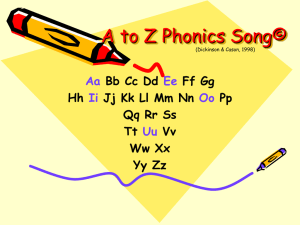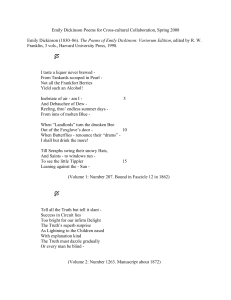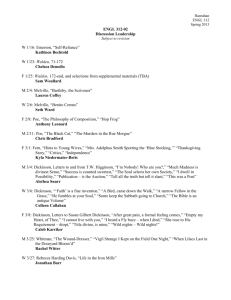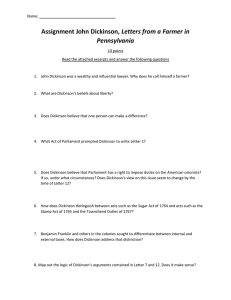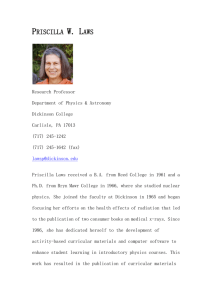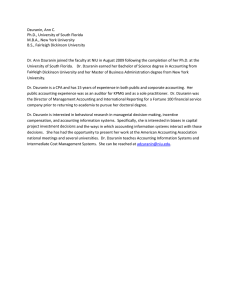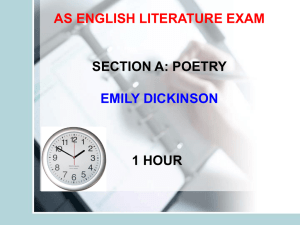Aiericai Uistory of to
advertisement
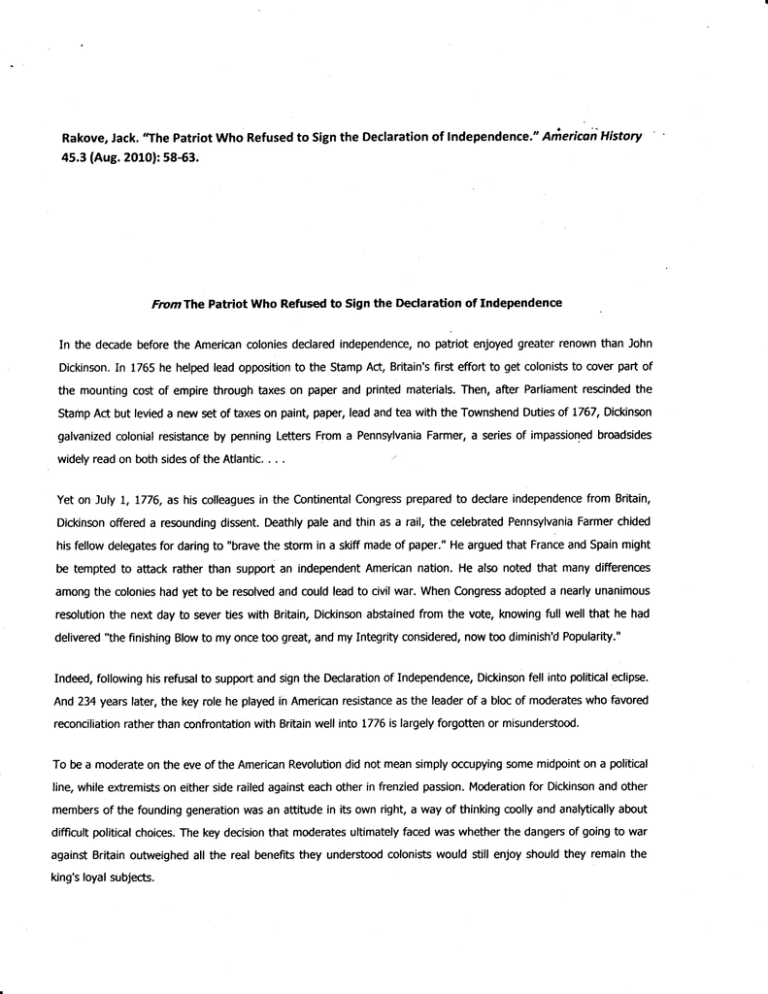
Rakove, Jack. "The Patriot Who Refused to Sign the Declaration of Independen ce." 45.3 (Aug. 2010f: 58-63. Aiericai Uistory FrcmThe Patriot Who Refused to Sign the Declaration of Independence In the decade before the American colonies declared independence, no patriot enjoyed greater renown than John Dickinson. In 1765 he helped lead opposition to the Stamp Act, Britain's first effort to get colonists to cover part of the mounting cost of empire through taxes on paper and printed materials. Then, after Parliament rescinded the Stamp Act but levied a new set of taxes on paint, paper, lead and tea with the Townshend Duties of 1767, Dickinson galvanized colonial resistance by penning Letters From a Pennsylvania Farmer, a series of impassioned broadsides widely read on both sides of the Atlantic. . . Yet on July 1, . 1776, as his colleagues in the C.ontinental Congress prepared to declare independence from Britain, Dickinson offered a resounding dissent. Deathly pale and thin as a rail, the celebrated Pennsylvania Farmer chided his fellow delegates for daring to "brave the $orm in a skiff made of paper." He argued that France and Spain might be tempted to attack rather than support an independent American nation. He also noted that many differences among the colonies had yet to be resolved and could lead to civil war. When Congress adopted a nearly unanimous resolution the next day to sever ties with Britain, Dickinson abstained from the vote, knowing full well that he had delivered "the finishing Blow to my once too great, and my Integrity considered, now too diminish'd Popularity." Indeed, following his refusal to support and sign the Declaration of Independence, Dickinson fell into political eclipse. And 234 years later, the key role he played in American resistance as the leader of a bloc of moderates who favored reconciliation rather than confrontation with Britain well into 1776 is largely forgotten or misunderstood. To be a moderate on the eve of the American Revolution did not mean simply occupying some midpoint on a political line, while extremists on either side railed against each other in frenzied passion. Moderation for Dickinson and other members of the founding generation was an attitude in its own right, a way of thinking coolly and analytically about difficult political choices. The key decision that moderates ultimately faced was whether the dangers of going to war against Britaln outweighed all the real benefits they understood colonists would still enjoy should they remain the king's loyal subjects. Dickinson and his moderate cohorts . . . were not inclined to suspect that the British government was in the hands of liberty-abhorring conspirators. Instead, they held out hope well into L776 that their brethren.across.Jhe Atlantic would come to their senses and realize that any effort to rule the colonies by force, or to deny colonists their due rights of self government, was doomed to failure. They were also the kind of men British officials believed would choose the benefits of empire over sympathy for suffering Massachusetts, the colony that King George III, his chief minister, Lord North, and a docile Parliament set out to punish after the Boston Tea Party of December 1773. Just as the British expected the Coercive Acts that Parliament directed against Massachusetts in L774 would teach the other colonies the costs of deffing the empire, so they assumed that sober men of property, with a lot at stake, would never endorse the hot-headed proceedings of the mob in Boston. Yet in practice, exactly the opposite happened. Dickinson and other moderates ultimately proved they were true patriots intent on vindicating American rights. Whatever the social differences between the colonies and the mother country, England was a dynamic, expanding and intellectually creative society. Like many moderates in the mid-1770s, Dickinson believed that the surest road to American prosperity lay in a continued alliance with the great empire of the Atlantic. Another source of Dickinson's moderation lay in his complicated relation to the Quaker faith. Dickinson's parents were both Quakers and so was his wife, Mary Norris, the daughter and heiress of a wealthy Pennsylvania merchant and landowner. Dickinson balked at actively identifying with the Friends and their commitment to pacifism. Even though he worried as much as any moderate about resistance escalating to all-out warfaret he supported the militant measures Congress began pursuing once the British military clampdown began in eamest. But at the same time, Dickinson's rearing and close involvement with Quaker culture left him with an ingrained sense of his moral duty to seek a peaceful solution to the conflict. Dickinson's belief that the colonists should make every feasible effoft at negotiation was reinforced by his doubts as to whether a harmonious American nation could ever be built on the foundation of opposition to British misrule. Remove the superintending authority of empire, Dickinson worried, and Americans would quickly fall into internecine conflicts of their own. Dickinson and other moderates shared an underlying belief with more radical patriots that the colonists' claims to be immune from the control of Parliament rested on vital principles of self-government. Even if Boston had gone too far with its tea party, the essential American pleas were just. But the moderates also desperately hoped that the situation in Massachusetts would not spin out of control before the government in London had a fair oppoftunity to gauge the depth of American resistance and respond to the protests Congress submitted to the Crown. fln 7775,mlany delegates felt that the time for reconciliation had already passed. The king and hii tinirtbi, nuC received an "olive branch" petition from the First Congress and ignored it. Dickinson delivered a heartfelt speech in which he acknowledged that the colonists must "prepare vigorously for War," but argued that they still owed the mother country another chance. "We have not yet tasted deeply of that bitter Cup called the Fortunes of War," he said. Any number of events, from battlefield reverses to the disillusion that would come to a "peaceable People jaded out with the tedium of Civil Discords" could eventually tear the colonies apart' DickinsonandothermoderatesprevailedonareluctantCongresstodraft...petition[s]ntoGeorgeIII ...which, John Adams and others sneered, was an exercise in futility. *** Having pushed so hard to give peace a chance, Dickinson felt equally obliged to honor his other commitment to "prepare vigourously for War." In the weeks leading up to the vote on independence, Dickinson chaired the committee that Congress appointed to draft Articles of Confederation for a new republican government. Meanwhile, he remained the last major foe of separation. Other moderates, like Robert Morris of Pennsylvania and John Jay of New York, also had hoped that independence could be postponed. Yet having grown increasingly disenchanted with Britain's intransigence, they accepted the congressional consensus and redoubled their commitment to active participation in "the cause." Only Dickinson went his own way. Perhaps his Quaker upbringing left him with a strong conscience that prevented him from endorsing the decision that others now found inevitable. Perhaps his youthful memories of England still swayed him. In either case, conscience and politicaljudgment led him to resist independence at the final moment, and to surrender the celebrity and influence he had enjoyed over the past decade. Eventually Dickinson returned to public fif". ... He was also a delegate to . the Constitutional Convention in 1787 and promoted the resulting framework for the young republic in a series of essays written under the pen name Fabius. Despite his accomplishments late in life, Dickinson never fully escaped the stigma of his opposition to independence.
